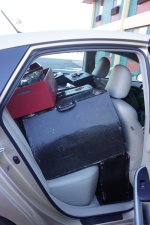Siegmund
Well-known member
We have all heard the joke about leaving an accordion in an unlocked car, and coming back to find a second one has been tossed in beside it (plus or minus the stray banjo or viola.)
I can now confirm it is true. And if you park your car beside the wrong pawnshop in Butte, Montana, on a Sunday night, this is what you see on Monday morning:

In the run-up to the Backwoods Accordion Festival (see thread in the Events section), I saw a facebook comment from a guy from Butte saying he had wanted to come up and bring some old accordions with him, but couldn't make it. I wrote to him and told him I was going to be down his way in a couple weeks.
He turned out to have eleven instruments, none his originally, that had spent 15 or 20 years in his (dry!) basement. All eleven were thankfully free of mold and rust.
I came home with eight: 3 steirische Harmonikas, one CBA, and four PAs.
The three Harmonikas are in playing condition, but use too much air. Among the others, there's a Noble Bandmaster in excellent shape except for one bass-side leak that causes one bass reed to sound continously (and we found the square of leather off the pallet loose underneath the bass machine); a Hohner Tango IIM that mostly-sorta-works but has stiff register switches, probably needs an all-over cleaning of gunk out of it; and three that need more done to them: a Noble Adam with 1 reed fallen out and a bunch of floppy leathers, a Sonarino (or something like that, it's a name I've never seen) in similar shape, and a big heavy Accordiola B-system CBA, 5 octaves LMM (6 reed blocks very close together) and 3+3 basses, suffering from several sticky keys, a fallen-out reed, and lots of old leather.
I am hopeful that these will prove to be a relatively cheap education in repairing and restoring. I am sure the forum will get to listen to me whining about how much harder it turns out to be than I think it will be.
I passed up a fourth steirische, a second Tango IIM that had spent years lying on its side in a soft-sided suitcase, and a 1930s Guerrini. I was tempted by the last -- beautiful metal grillework, 4 treble reeds, just the one palm switch to toggle between 2 and 4 reeds. The reeds looked and sounded good, but it too sat on its side for the full 20 years (in a good hard case) and probably needs every leather in the whole thing replaced, as well as having something broken in the register mechanism between the palm switch and the place the lever re-emerges from behind the keyboard. If that sounds like a project you'd like to tackle, quite sure it's for sale cheap, and I can put you in touch with the guy.
I can now confirm it is true. And if you park your car beside the wrong pawnshop in Butte, Montana, on a Sunday night, this is what you see on Monday morning:

In the run-up to the Backwoods Accordion Festival (see thread in the Events section), I saw a facebook comment from a guy from Butte saying he had wanted to come up and bring some old accordions with him, but couldn't make it. I wrote to him and told him I was going to be down his way in a couple weeks.
He turned out to have eleven instruments, none his originally, that had spent 15 or 20 years in his (dry!) basement. All eleven were thankfully free of mold and rust.
I came home with eight: 3 steirische Harmonikas, one CBA, and four PAs.
The three Harmonikas are in playing condition, but use too much air. Among the others, there's a Noble Bandmaster in excellent shape except for one bass-side leak that causes one bass reed to sound continously (and we found the square of leather off the pallet loose underneath the bass machine); a Hohner Tango IIM that mostly-sorta-works but has stiff register switches, probably needs an all-over cleaning of gunk out of it; and three that need more done to them: a Noble Adam with 1 reed fallen out and a bunch of floppy leathers, a Sonarino (or something like that, it's a name I've never seen) in similar shape, and a big heavy Accordiola B-system CBA, 5 octaves LMM (6 reed blocks very close together) and 3+3 basses, suffering from several sticky keys, a fallen-out reed, and lots of old leather.
I am hopeful that these will prove to be a relatively cheap education in repairing and restoring. I am sure the forum will get to listen to me whining about how much harder it turns out to be than I think it will be.
I passed up a fourth steirische, a second Tango IIM that had spent years lying on its side in a soft-sided suitcase, and a 1930s Guerrini. I was tempted by the last -- beautiful metal grillework, 4 treble reeds, just the one palm switch to toggle between 2 and 4 reeds. The reeds looked and sounded good, but it too sat on its side for the full 20 years (in a good hard case) and probably needs every leather in the whole thing replaced, as well as having something broken in the register mechanism between the palm switch and the place the lever re-emerges from behind the keyboard. If that sounds like a project you'd like to tackle, quite sure it's for sale cheap, and I can put you in touch with the guy.

